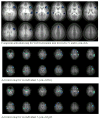Practical aspects of conducting large-scale functional magnetic resonance imaging studies in children
- PMID: 12593460
- PMCID: PMC1351160
- DOI: 10.1177/08830738020170122201
Practical aspects of conducting large-scale functional magnetic resonance imaging studies in children
Abstract
The potential benefits of functional magnetic resonance imaging (MRI) for the investigation of normal development have been limited by difficulties in its use with children. We describe the practical aspects, including failure rates, involved in conducting large-scale functional MRI studies with normal children. Two hundred and nine healthy children between the ages of 5 and 18 years participated in a functional MRI study of language development. Reliable activation maps were obtained across the age range. Younger children had significantly higher failure rates than older children and adolescents. It is concluded that it is feasible to conduct large-scale functional MRI studies of children as young as 5 years old. These findings can be used by other research groups to guide study design and plans for recruitment of young subjects.
Figures
References
-
- Hertz-Pannier L, Gaillard WD, Mott S, et al. Noninvasive assessment of language dominance in children and adolescence with functional MRI: A preliminary study. Neurology. 1997;48:1003–1012. - PubMed
-
- Holloway V, Gadian DG, Vargha-Khadem F, et al. The reorganization of sensorimotor function in children after hemispherectomy: A functional MRI and somatosensory evoked potential study. Brain. 2000;123:2432–44. - PubMed
-
- Gaillard WD, Hertz-Pannier L, Mott SH, Barnett AS, LeBihan D, Theodore WH. Functional anatomy of cognitive development: fMRI of verbal fluency in children and adults. Neurology. 2000;54:180–185. - PubMed
-
- Gaillard WD, Pugliese M, Grandin CB, et al. Cortical localization of reading in normal children: an fMRI language study. Neurology. 2001;57:47–54. - PubMed
Publication types
MeSH terms
Grants and funding
LinkOut - more resources
Full Text Sources
Medical


